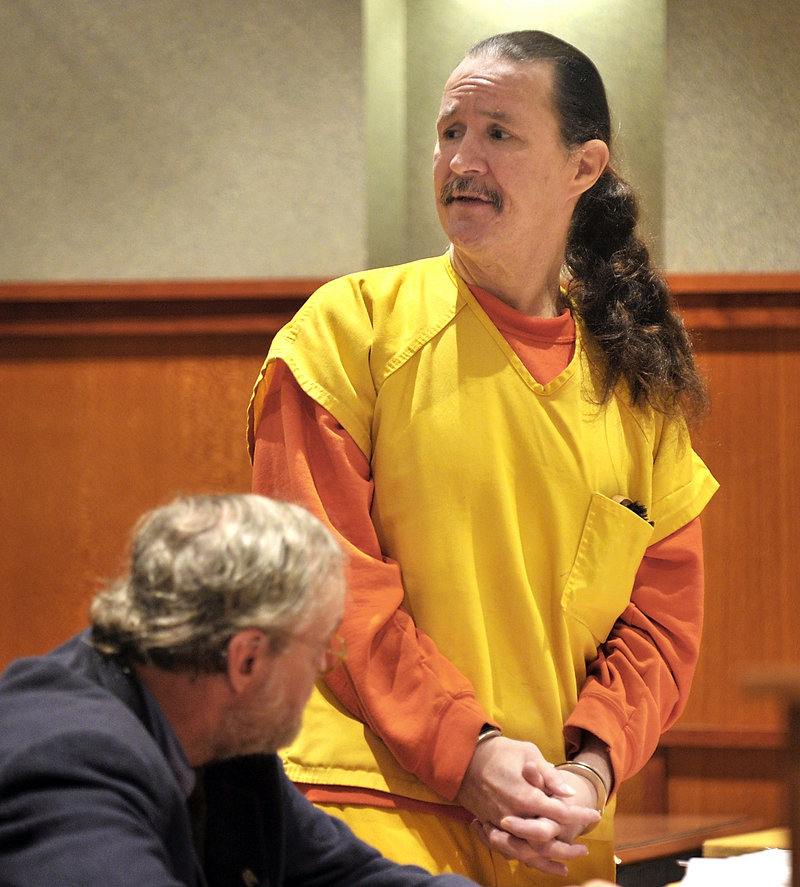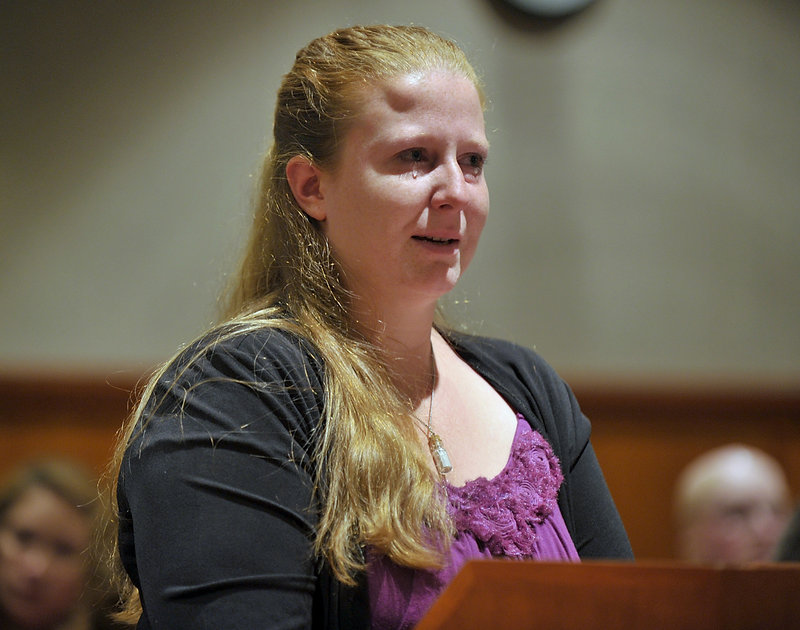PORTLAND — Carly Downs always made a point of visiting her father on Father’s Day. On Sunday, she visited his grave, collapsing to the ground with grief over the man who would not be there to walk her down the aisle or watch her graduate from college.
“I just really hate that those opportunities were stolen from me. I miss him every day,” Downs said through tears Tuesday as a judge prepared to sentence Ernest Weidul, the man who was convicted of killing her father, Roger Downs Jr., in 2010.
Superior Court Justice Joyce Wheeler sentenced Weidul to 16 years in prison and four months of probation. Weidul, who has a criminal history dating back to 1978, could spend an additional four years in prison if he violates probation, Wheeler said.
“He has done everything he can to convince himself that this death did not result from his conduct, but the jury said that it did,” Wheeler said. “It was alcohol mixing with Mr. Weidul’s mental-health issues that caused this to erupt into the kind of beating that occurred.”
Downs, who was 46, and Weidul had been drinking coffee brandy together for hours when Weidul turned on Downs and beat him repeatedly.
A jury last month convicted Weidul of manslaughter and aggravated assault, concluding that Weidul set in motion the events that caused Downs’ death.
The case almost didn’t get prosecuted.
Downs didn’t go the hospital right after the attack. He died two days later from respiratory arrest, after Mercy Hospital was unable to insert a breathing tube because of swelling.
Weidul was held in the Cumberland County Jail on a charge of simple assault in connection with the attack, and was considering an agreement to plead guilty to that charge and be sentenced to the six months he had served. Had that happened, the manslaughter charge could not have been brought against him.
Before any plea agreement was reached, state Medical Examiner Margaret Greenwald determined that Downs’ death was a homicide.
Weidul was indicted on the manslaughter charge and prosecuted by Deputy Attorney General William Stokes.
“The intensity of that beating must have been absolutely ferocious,” Stokes said in arguing Tuesday for an 18-year sentence with four years of probation. “By the defendant’s own admission, he hit the victim 30 times, maybe more. This was a pummeling of a man in his own apartment.”
Downs’ daughter, his sister and a cousin addressed the court, each recounting a man who was a vital part of a large, loving family.
While conceding that Downs battled “demons,” they said he was a successful commercial fisherman, a remarkably intelligent man who read astrophysicist Stephen Hawking, and a devoted member of the family — a dozen relatives sat in the gallery of Cumberland County Unified Court.
“We love each other fiercely,” said Vicki Legere, Downs’ sister, who showed the judge a photograph of her, her two brothers and their grandmothers, arms intertwined.
“To me, it’s like 9/11. He was taken from us by some senseless violent act,” she said. “He was by no means an angel, but our family will not let him be defined by depression or alcoholism and the things that he fought.”
Weidul’s lawyer, Thomas Connolly, argued for leniency, pointing out that Weidul clearly did not want Downs to die and was remorseful. He also said the actions of others contributed to the death, and that should mitigate his sentence.
Weidul also addressed the court, at one point challenging elements of his conviction and accusing prosecutors and even members of his defense team of misconduct. He also said he regrets Downs’ death.
“That man did not deserve to die. He should never have died, at least not that way,” said Weidul, standing at the defense table, dressed in a yellow jail outfit over an orange long-sleeve shirt, his hair pulled back in a ponytail.
He sought to argue with Stokes about whether he initiated the actions that led to Downs’ death, but Wheeler threatened to remove Weidul from the courtroom if he continued.
Throughout the trial, Downs’ family heard the defense argue that the victim bore some of the blame, that he drank excessively with Weidul and then provoked him.
They heard Weidul’s defense argue that Mercy Hospital was partly to blame, that the hospital could have saved Downs but the medical care was inadequate.
The jury didn’t see it that way, and neither did Wheeler as she sentenced Weidul.
Mary MacMaster, Downs’ cousin, said after the hearing that Wheeler’s conclusions were important for the family to hear.
“It was good to hear the judge say he was responsible, he could have left, he did cause this and that it was unprovoked,” MacMaster said.
Weidul said he plans to appeal his conviction and sentence, a process that could take about a year.
Staff Writer David Hench can be contacted at 791-6327 or at: dhench@pressherald.com
Copy the Story Link
Send questions/comments to the editors.





Success. Please wait for the page to reload. If the page does not reload within 5 seconds, please refresh the page.
Enter your email and password to access comments.
Hi, to comment on stories you must . This profile is in addition to your subscription and website login.
Already have a commenting profile? .
Invalid username/password.
Please check your email to confirm and complete your registration.
Only subscribers are eligible to post comments. Please subscribe or login first for digital access. Here’s why.
Use the form below to reset your password. When you've submitted your account email, we will send an email with a reset code.